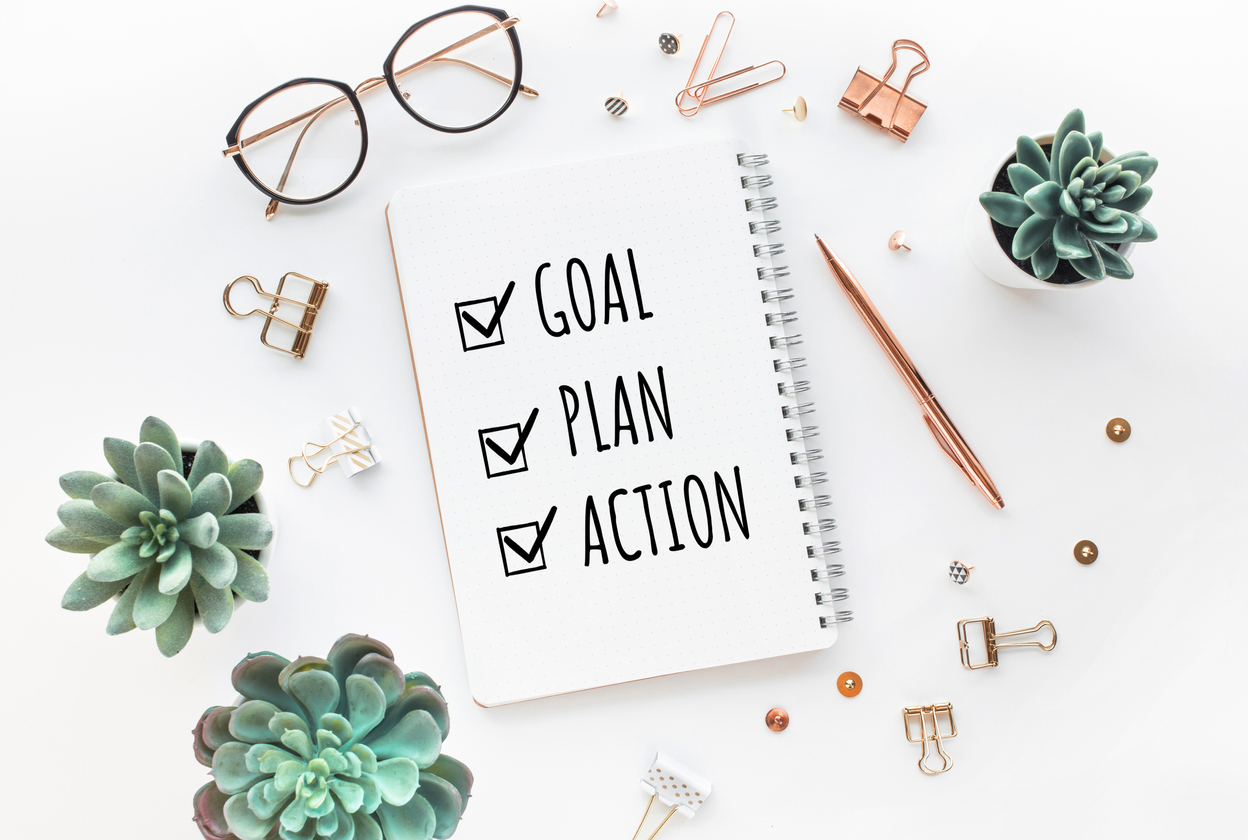
While the focus on January has been about setting goals for 2020 and having a fresh start, whether it’s with work, friends, family, or relationships, this year’s collection of self-help articles add the weight of facing a new decade, as well. There have also been plenty of articles that help you review the last 10 years in anticipation for what’s to come in the next 10 years.
Well, that can be overwhelming.
As any good leadership coach will tell you (or any coach really), we don’t think in terms of planning out 10 years. It’s nice to have a vision for where you want to be. The next part is making plans that start with what’s in front of you. Then working toward those goals, always keeping in mind that you may have to shift and pivot as life unfolds in front of you — because life rarely delivers to us exactly what we want. That’s life.
Here is a simple framework for how to get started with figuring out exactly how to set the most important 2020 goals first, and then move forward with determination and confidence.
What do you want?
That sounds simple enough, but like I said, we want to look at the big picture and then funnel down to what’s in front of us today that we can tackle first. Ask yourself:
- What do I want to do?
- Who do I want to be?
- What do I want to have?
Now ask yourself those same questions as they apply to this year. What do I want to do, be, or have in 2020? How will I set goals for 2020 to achieve those things? Take your decade vision and focus it for the next 11 months. What’s tangible? What’s reasonable? What’s a goal that will take you outside your comfort zone but still be achievable by December? Remember, we’re not trying to set ourselves up for failure here.
How bad do you want it?
It’s easier to set goals for 2020 to be achieved in 2030 and then sit back because you have 10 years to accomplish it. These questions below will help you get out of that mindset to recognize that if it’s important to you, then the sooner you make changes the better. Ask yourself:
- How motivated are you to change or act?
- How does it link to your values?
- How willing are you to monitor the change?
Here’s an example of how this plays out. Let’s look at a young woman who is a few years out of college and in 2020 she’s decided that this is the decade she gets promoted to a management position. For this exercise, she’ll do some self reflection. How realistic is it to get promoted at her current job? Is she spending time with people who are as serious about their careers as she is? Does she have a strong network, or is she building the kind of network that will help her grow? In this instance, some self reflection will help her make small changes. She could set goals in 2020 to join a professional organization, find a mentor who can advise her, and change the way she shows up to work. Does she need to upscale the way she dresses, the way she behaves, or the way she engages with peers? This type of small mindset change will have immediate impact, and also far-reaching impact that will help her open a road to her long-term goals for 2020 and beyond.
Why do you need this?
Many times, I will work with clients and ask them this question. Why did you come to me? Why now? What’s going on in your life now that you decided you needed a coach or advisor?
The answers are very telling. For those who are stuck and having pain, meaning their lack of progress is causing them frustration, they tend to respond to coaching really well. For those who tell me that they thought they would be further along by now but not sure why it’s taking so long, that’s a clue that they haven’t figured out their “why” yet. For those people, answering these questions helps them understand what’s important to them and whether the goals they pursued (sometimes aimlessly) were actually the best use of their time. Ask yourself:
- Why is this goal important?
- Why does it matter to you?
- Why is that reason important?
- Why is that second reason important?
You may be wondering why I have the same question in here twice. Here’s how this plays out. For our friend who wants a management position, she might say that this goal is important because she’d like to be well established in her career by the time she’s in her 30s. Why does it matter? Because then she can focus on her personal life. Why is that important? Because she’d like to be in a healthy relationship with a steady job and promising future. Why is that important? Because she’d also like to have a family and a strong financial foundation is important to her.
And that’s the point. A little bit of digging helps you uncover bigger motivating factors that you may not have realized were important to you. When that bubbles up, you’re better able to find the “why” that may have been missing from the equation.
How do you want to get there?
As I mentioned before, life can be unpredictable. So when we ask ourselves how we want to achieve our goals, we have to leave room for some unpredictability. At the same time, we want to outline a process that’s high-level enough to see the path ahead, but open to some twists and turns without derailing your progress. Ask yourself:
- What are the specifics of how to move forward?
- What is the next very small step you can take?
- How will you hold yourself accountable?
This is a pretty straight-forward coaching approach. Start with the path to achieving your goals. If you set ambitious goals for the next decade, you’ll want to figure out the small steps you can take this year to set you on that path. If you set goals for the end of this year, you’ll want to ask yourself what you can get done each month while revisiting every 90 days. For accountability, it’s important to figure out what works best for you. Do you work better with a partner who will check in with you? Are you good with writing down your goals for 2020 and feeling satisfaction when you cross them off your list? Figure out the best way to hold yourself accountable without making it too easy to let yourself off the hook.
What’s holding you back?
This is the big one. After going through this entire exercise, it’s time for some straight talk. For many of us, it’s easy to answer all of these questions. We have clarity and vision and a sense of purpose and excitement. We’ve made these goals each year, and each year we start out in January with a revised set of the same goals. So how do we shake ourselves out of it? Ask yourself this one question:
- If I wasn’t afraid, what would I choose?
Sure, some of you would choose to scrap it all and move to the Bahamas. Even that answer is telling. Why do you want to escape? Dig into your “why” questions until you find that last reason. Something about the path you’ve chosen for yourself might be unsatisfying, and if that’s the case, be honest about where you’d really rather be.
Some of you have clarity and really want the changes you’ve mapped out for yourselves. So what’s holding you back? This can be related to fear, but not in an obvious way. Many of us look at the simple expression of fear as an indicator that we are afraid to fail. What if I put myself out there and it doesn’t work? I’ll be devastated. Sure, that could happen. In my coaching work, however, I find more people have another kind of fear. What if I succeed? What will happen to the comfortable life I’ve created for myself? How will my success impact the people around me? How will it change me?
Fear can show up in funny ways, so if you’re facing some blocks that keep you from making great progress, ask yourself what your life would look like if you removed fear — fear of failure or fear of success. If you find you have crippling fear, then acknowledge it and respect it. Fear absolutely helps to keep us from doing stupid things. If fear is flaring up, then you might not be ready for the changes you have planned, and that’s okay. Small changes that you can control will help you to move toward your goals without too much disruption. As bigger opportunities come from those small changes, you’ll be better able to step into those situations without fear holding you back.
One last thing on setting goals for 2020
My recommendation for following this process as you set goals for 2020 and beyond is to do it more often in the beginning. For our friend who wants to be in management, she should review her progress quarterly in the first two years, and then review every year or two after that. By the fifth year, you’ll have a better idea how you’re doing. And don’t be surprised if year five starts to show you those twists and turns. The halfway mark is usually the point where we come to terms with how well we are progressing, and how much we still want that big goal.
Christina Holloway is an executive coach and business coach. She helps executives and entrepreneurs grow their companies faster, create results-driven teams, and increase profitability. She has been featured in Forbes, The Huffington Post, Addicted2Success and Fast Company. If you’re interested in working with Christina, take a look at her strategy sessions and contact her to get started.

